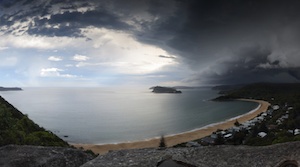
Prepare now for summer weather extremes
Summer in Australia is the time of year Australians enjoy the great outdoors and holiday in our country’s beautiful landscapes – whether that is at the beach, in our rainforests or at a multitude of pristine holiday destinations on offer.
Summer can bring busy times for a great deal of caravan park owners/managers providing wonderful holiday experiences for their guests.
The warmer weather can at times bring with it the weather extremes we have become so used to, such as cyclones, hail storms, flooding, and bushfires. With this in mind, and with weather conditions generally less extreme at this time of year, now is the perfect time to make sure your emergency plan is up to date and staff are well versed with their roles should the unimaginable happen.
It is essential that your plan is straightforward and is embraced by you and your employees. The plan will work best if everyone understands their responsibilities and what they will need to do in the event of an emergency.
The types of things that should be covered in an emergency plan include:
- An evacuation strategy
- Monitor the media and take advice from authorities.
- Identify evacuation routes and emergency assembly sites to account
- for staff and guests.
- Identify who has the authority to order an evacuation.
- Establish a chain of command to ensure that all key roles and
- responsibilities are covered.
Emergency supplies
- Have a first-aid kit and advise employees of its location.
- Identify people who have completed first-aid training and train staff
- if necessary.
- Secure your business
- Determine which machinery, equipment, cabinets or safes may need
- to be secured.
- Identify people to lock doors and secure your premises.
- Ensure that responsible staff have the right keys, passwords
- or combinations.
- Decide whether a special security plan is needed for your
- computer systems.
Consider developing a specific security plan
- How would you protect your information, your premises and your staff?
- Work out how you would deal with a threat to your business, such as a
- bomb threat.
- Regularly practice and refine your security plan.
- Insurance
- Speak with your insurance company and make sure you are
- properly insured.
- Communication plan
- Work out how you will communicate with emergency services, your
- employees, customers and suppliers in the event of an incident.
Make checklists
- Checklists can help to ensure that your plan gets put into practice.
- Set out what needs to be done, by whom and when. Identify backups
- for key jobs in case someone is away.
- It can be a good idea to set out what needs to be done immediately
- and what needs to be done in the following 24 or 48 hours.
Remember, preparation is everything when it comes to executing an emergency plan successfully.
Make sure you involve all your staff, whether they work fulltime part-time or casual hours as disasters can hit at any time. Regularly include elements of your emergency plan into your team meetings. This has a two level effect:
- It reminds staffs of their roles during an emergency.
- It reinforces to staff that you take the preparation for an emergency very seriously and shows you are committed to the safety of all.
Preparedness of staff is vital to the execution of your emergency plan, so keep them up to date and informed.
The State Emergency Services around Australia provide excellent information related to how people can be best prepared and help themselves in times of emergency. Visit the Australia.gov.au website to obtain contact details of SES in your state or territory.
Summer is just around the corner, so be prepared!

AccomNews is not affiliated with any government agency, body or political party. We are an independently owned, family-operated magazine.







